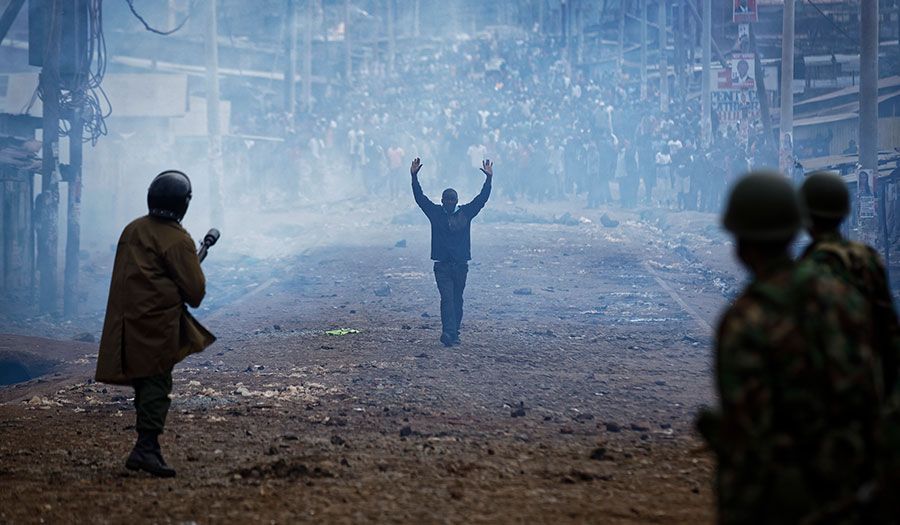 AP/Ben Curtis
AP/Ben Curtis
World News Desk
Learn the why behind the headlines.
Subscribe to the Real Truth for FREE news and analysis.
Subscribe NowNAIROBI, Kenya – Speaking at a Sunday church service, Kenya’s opposition leader Raila Odinga stated that he is not open to a power-sharing arrangement. His comments come days after a Supreme Court decision annulled President Uhuru Kenyatta’s re-election and ordered a new presidential election after 60 days.
President Uhuru Kenyatta voiced similar sentiments the day before when addressing elected members of county assemblies from his Jubilee Party.
Mr. Odinga, 72, was named Prime Minister and Kenyatta his deputy in a coalition government in 2008 February following the disputed presidential election of Dec 27, 2007. More than 1,000 people died and 600,000 were evicted from their homes in post-election violence that erupted from that vote.
The Supreme Court invalidated Mr. Kenyatta’s win announced by the electoral commission on August 11, concluding that the electoral commission’s vote tallies were marred by irregularities and illegalities.
Mr. Odinga said the present electoral commission should not to conduct the fresh election, saying it was complicit in electoral fraud.
However, Mr. Kenyatta has said the electoral commission should not be interfered with and warned the court against taking action on the Independent Electoral and Boundaries Commission. He said he will fix the judiciary once he wins the coming elections because it ruled against him.
The move to nullify Kenya’s election was unprecedented in Africa. It renewed hope for Mr. Odinga, who had alleged ballot tampering after the results of the August 8 vote were released. A longtime opposition candidate and the son of Kenya’s first vice president, Mr. Odinga unsuccessfully challenged the results of the 2013 vote that Kenyatta won.
Kenya braced for protests before the ruling, with police deployed to parts of the capital, Nairobi, and streets near the court were barricaded. Human rights groups have said that police killed at least 24 people in unrest after the election.
If a fresh election yields a victory for Mr. Odinga, Mr. Kenyatta, son of Jomo Kenyatta, Kenya’s first president, would become the first Kenyan president not to win re-election.
Those who spend time in Kenya during election season, as Real Truth staff did just prior to 2007’s tumultuous ballots, quickly gain an understanding of the sharp divisions between supporters of the presidential candidates.
Above and beyond party affiliations and political ideologies or platforms, the ethnic backgrounds of those running for office there are a major factor among the electorate. Mr. Odinga, from the Luo tribe, garners majority support among Luo Kenyans. Mr. Kenyatta holds similar sway among the Kikuyu community.
Since Kenya gained independence in 1963, allegations of favoritism of one’s own tribe, and suppression of other ethnic groups, have dogged politicians from prime ministers to local officials. Allegations of electoral irregularities can ignite high levels of tensions in city slums, typically segregated into tribal sections, but in which rival factions are jammed side-by-side in extremely difficult living conditions.
The weeks ahead are sure to be monitored closely by many nations. Following the Supreme Court decision, U.S. Ambassador to Kenya Robert F. Godec released a statement in favor of a new election, which began: “As a long-time friend, the United States continues to follow closely Kenya’s presidential election process. We welcome the decision by Kenya’s opposition alliance, NASA [National Super Alliance], to go to the Supreme Court with its concerns regarding the results of the presidential poll. The Supreme Court is the constitutional venue to address disputes. We look forward to the court resolving the questions NASA has raised in accordance with the rule of law and in the light of the evidence.”
This article contains information from The Associated Press.
More on Related Topics:
- Libya’s Instability Will Worsen Further Without a Unified Government and Elections, UN Envoy Says
- U.S. Warns a Famine in Sudan Is on Pace to Be the Deadliest in Decades as the World Looks Elsewhere
- U.S. Hands Over Its Last Military Base in Niger to the Ruling Junta
- Rights Group Says Sexual Violence Is Rampant in Sudan’s Conflict
- 755,000 People at Risk of Famine in Coming Months in War-torn Sudan, Experts Warn


